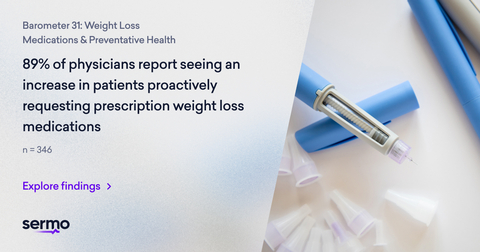Survey Examines 300+ Global HCPs’ Sentiments Around Prescription Weight Loss Trends, Preventative MRIs & Concierge Medicine
The 31st Barometer survey from Sermo, a physician-first online community and leader in HCP insights, of 300+ global practitioners revealed that 77% of HCPs feel that celebrities and influencers’ enthusiasm for prescription medications for weight loss or a weight loss benefit causes patients to have unrealistic expectations of the medications.
This press release features multimedia. View the full release here: https://www.businesswire.com/news/home/20231011843642/en/

Sermo Barometer Examines Influencers’ Impact on Patient Perceptions of Weight Loss Medications (Graphic: Business Wire)
Patients want prescription weight loss medications and HCPs are meeting their demands. 89% of surveyed HCPs reported that they have seen a recent increase in patients proactively requesting prescription weight loss medications. 92% of PCPs reported actively writing scripts for weight loss drugs or drugs with a weight loss benefit in the past year.
In addition to the boost in word of mouth from celebrities and influencers, a recent analysis by MediaRadar found that ad spending for diabetes and weight loss prescriptions has increased by 21% compared to last year. Sermo’s survey found that among patients who proactively request weight loss medications, 48% of surveyed HCPs reported that their patients only have brand awareness of Ozempic. Another 23% of patients are aware of multiple brands.
The high demand for prescription medications for weight loss or a weight loss benefit does not come without issues for both patients and HCPs:
77% of HCPs said their patients experienced side effects and 65% of HCPs reported that patients stopped taking the medication as a result of side effects. “There has been a significant increase in patients requesting semaglutide-type medications as the social buzz has prompted the weight loss effects of these meds,” Dr. Ashish Rana, MD Internal Medicine Program Director & Associate Chair of Academic Medicine at Crozer Health in Pennsylvania and Sermo Medical Advisory Board Member. “Side effects of these medications are not highlighted, which leads patients to then complain when they occur and can ultimately lead to a rebound in weight if they give up on the medicine.”
Accessing these weight loss medications is also a common issue. 89% of surveyed U.S.-based HCPs reported that they have struggled with getting prior authorization approval. Overall, HCPs are finding manufacturer resources and tools helpful when navigating patient coverage for these medications as reported by 63% of U.S.-based surveyed HCPs. Endocrinologists found manufacturer resources the least helpful with only 27% reporting the tools have helped them navigate eligibility when starting a new patient on a medication.
HCPs aren’t fans of non-traditional healthcare settings, such as MedSpas and telehealth companies, prescribing weight loss medications. 75% of surveyed HCPs reported these settings as problematic due to patients not receiving the proper monitoring that they would in a doctor’s office (61%) and prescribers in these settings not being familiar enough with possible side effects (57%). 71% of endocrinologists find these MedSpas problematic because they cause drug shortages for those who actually medically need the medications.
Preventative Healthcare Trends
- Mixed Views on Whole-Body MRI: 42% of HCPs report patients inquiring about whole-body MRI scans while only 23% of surveyed HCPs find whole-body MRI scans useful for prevention due to limited availability (62%), clinical insignificance of findings (58%), and patient anxiety (53%). Also, 77% of HCPs believe celebrity endorsements of whole-body MRIs mislead the public.
- HCPs Support Biomarker Testing: 56% of HCPs endorse biomarker testing alongside annual physicals, with 61% of endocrinologists recommending it.
- Concierge Medicine's Future: 54% of HCPs foresee membership-based/concierge medicine as the future of primary care, particularly among PAs and NPs (63%).
This survey was fielded between September 28 - October 2, 2023 as the 31st edition of Sermo’s ongoing Barometer survey. The survey included 346 global HCPs including PCPs, Endocrinologists, Cardiologists, OB-GYNs and Advanced Practice Providers. To explore more findings, visit: https://app.sermo.com/barometer
About Sermo:
Sermo is the largest global healthcare research company and the most trusted physician engagement platform. Sermo engages with more than 1.3 million HCPs across 150 countries and has reach into the U.S. Payer market that now exceeds 230M commercial lives covered.
For over 20 years, Sermo has been turning physician experience, expertise, and observations into actionable business insights that benefit pharmaceutical companies, healthcare partners, and the medical community at large. Sermo offers on-demand access to HCPs via a proprietary health-tech ecosystem to gain targeted HCP insights that inform strategic decisioning in real-time. To learn more, visit www.sermo.com.
View source version on businesswire.com: https://www.businesswire.com/news/home/20231011843642/en/
“There has been a significant increase in patients requesting semaglutide-type medications as the social buzz has prompted the weight loss effects of these meds,” Dr. Ashish Rana, MD Sermo Advisory Board Member.
Contacts
Media:
Allyson Noonan
allyson.noonan@gmail.com
(858) 245-7256






